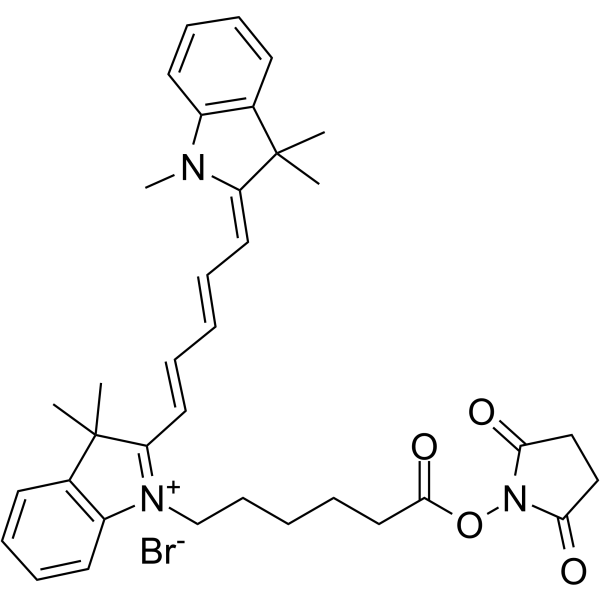Cyanine5 NHS ester bromide
Modify Date: 2024-01-14 10:49:32

Cyanine5 NHS ester bromide structure
|
Common Name | Cyanine5 NHS ester bromide | ||
|---|---|---|---|---|
| CAS Number | 1653991-59-3 | Molecular Weight | 660.64 | |
| Density | N/A | Boiling Point | N/A | |
| Molecular Formula | C36H42BrN3O4 | Melting Point | N/A | |
| MSDS | N/A | Flash Point | N/A | |
Use of Cyanine5 NHS ester bromideCyanine5 NHS ester bromide is a active compound, can be used to label amino groups in peptides, proteins, and oligonucleotides. Cyanine5 NHS ester bromide is a cyanine dye, fluorescence-labeling neurotensin (8-13) via arginine residues[1]. |
| Name | Cyanine5 NHS ester bromide |
|---|
| Description | Cyanine5 NHS ester bromide is a active compound, can be used to label amino groups in peptides, proteins, and oligonucleotides. Cyanine5 NHS ester bromide is a cyanine dye, fluorescence-labeling neurotensin (8-13) via arginine residues[1]. |
|---|---|
| Related Catalog | |
| In Vitro | Cyanine5 NHS ester bromide can be excitable with a red (635 nm) and a 488 nm argon laser, respectively[1]. Cyanine5 NHS ester bromide applys for characterization[1]: 1. Acquire high resolution mass spectra (HRMS) with Agilent 6540 UHD Accurate-Mass QTOF LC/MS system coupled to an Agilent 1290 HPLC system, using an ESI source. 2. Perform preparative HPLC with a system from Knauer (Berlin, Germany). A Kinetex-XB C18, 5 μm, 250 × 21 mm (Phenomenex, Aschaffenburg, Germany) is used as stationary phase. Mixtures of 0.1% aq TFA and acetonitrile are used as mobile phase. The flow rate is 18-20 mL/min, and a detection wavelength of 220 nm is used throughout. 3. Analysis HPLC with a system from Agilent Technologies. A Kinetex-XB C18, 2.6 μm, 100 × 3 mm (Phenomenex) serves as stationary phase at a flow rate of 0.5-0.6 mL/min. The oven temperature is set to 25 °C. Mixtures of 0.04% aq TFA and acetonitrile are used as mobile phase. The injection volume is 20 μL. Detection is performed at 220 nm. |
| References |
| Molecular Formula | C36H42BrN3O4 |
|---|---|
| Molecular Weight | 660.64 |